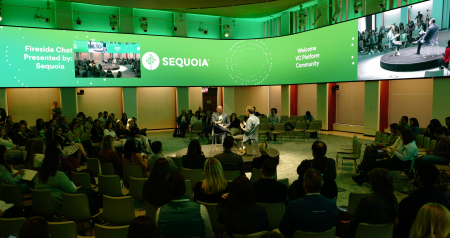
The 2024 Trends Shaping the Future in Event Experiences
As we step into 2024, events and experiential design will continue to evolve.
This year's trends represent a shift in how we view and engage with events, driven by societal changes, environmental awareness, and technological innovation. These trends are redefining the landscape of event experiences, offering fresh perspectives and innovative approaches.
At Happily, we are at the forefront of the ever-evolving world of technology and experiential design. Each trend reflects the innovative practices of industry leaders who are evolving the landscape of event production and experiential design. From embracing sustainability to incorporating advanced technologies, these trends are influencing the way we experience and interact in events.

Left Lane's Fast Growth Summit in London, 2023. An annual global event produced by Happily.
1. Sustainability is at the forefront of event production
Sustainability has become a key focus in event planning, reflecting the growing global dedication to protecting the environment. Modern event planners are increasingly integrating eco-friendly practices into every aspect of their events.
This trend includes a variety of environmentally conscious strategies, such as using biodegradable materials and reducing waste. A significant emphasis is also placed on local sourcing for food and decorations, which helps to reduce the overall carbon footprint of the event. The aim is to create events that are not only engaging for attendees, but also mindful of their environmental impact, thereby pioneering a new era in sustainable event planning.
At Happily, we are at the cutting edge of this movement, embracing sustainable practices in everything from material selection to waste management and local sourcing. Our commitment to these practices is helping to establish new standards for environmentally responsible event planning.
2. AI and VR will advance experiential personalization
The integration of AI (artificial intelligence) and VR (virtual reality) into event planning has transitioned from a futuristic vision to a present-day reality, revolutionizing the industry.
AI is being employed to customize events to match the unique preferences and behaviors of attendees, ensuring that each experience is not just engaging, but also deeply relevant and personalized. For instance, imagine attending a tech conference where AI algorithms curate personalized breakout sessions and networking opportunities based on your professional interests and goals. This level of customization ensures that you get the most value out of the event.
VR is notably changing the way events are planned, offering a more interactive and engaging approach. The Apple Vision Pro, a mixed reality headset by Apple, highlights this shift. Announced on June 5, 2023, at the Worldwide Developers Conference, and set for release in the United States on February 2nd, 2024, with an international release later in the year, this device allows users to virtually tour venues or preview events. This feature provides a helpful glimpse of what to expect. VR also facilitates the live streaming of events, allowing remote attendees to enjoy a sense of being part of the live audience. Such technological advancements are not only improving the experience for attendees but also changing how events are planned and carried out.
3. The hybrid model is the standard
The hybrid event model has risen to set a new benchmark in event planning by integrating in-person and virtual experiences. This format stands out for its exceptional flexibility and accessibility, dramatically broadening the reach and inclusiveness of events.
A national summit can be transformed into a global experience, where attendees, whether onsite or connecting remotely, can actively engage with people, content, and brands. This unified approach caters to the varied preferences of participants, ensuring a curated experience for both in-person and virtual attendees. The hybrid model offers more than adaptability to changing times; it represents a fundamental shift, redefining the future of event engagement.
At Happily, we blend physical and digital elements to create experiences that are cohesive and captivating. Our comprehensive skill set spans the full range of event execution: from immersive experiential design and cutting-edge web development to professional broadcasting, sophisticated audio/visual production, innovative graphic design, and strategic planning. Our approach, fueled by our diverse expertise, empowers us to create events that are dynamic, inclusive and deeply resonant with a varied audience. By doing so, we encapsulate the spirit of progressive, modern event planning, establishing new industry standards.

645 Ventures AGM, a hybrid event produced by Happily. New York, 2023.
4. Boosting engagement with event gamification
The world of event planning is seeing a dynamic shift with the introduction of gamification, a strategy that brings an interactive and engaging twist to traditional events.
This method is all about blending game-style challenges and rewards into the fabric of events, making participation not just fun but also deeply immersive. Imagine being at a conference where you're part of a digital scavenger hunt. Completing specific activities or attending key talks earns you point and prizes. This kind of gamification doesn't just up the fun factor; it encourages attendees to explore and connect more deeply with the event experience. When it comes to educational or training events, adding quizzes or interactive elements related to the content can make learning more effective and enjoyable. These strategies are perfect for sparking connections and community spirit among attendees.
At Happily, we harness our gamification expertise through our cutting-edge Web Studio. Here, we can craft bespoke microsites and apps, creating distinctive, interactive experiences tailored to each event. Our proficiency in technology, design, and strategy ensures that these gamified features are embedded into the event, elevating engagement while maintaining focus on the event's primary objectives.
5. Emphasizing wellness and mindfulness
Placing a high priority on attendee wellbeing is becoming a key element in modern event planning. With a growing awareness of the importance of holistic health, events are increasingly featuring zones for relaxation, mother’s rooms, wellness areas, and programs that are mindful of overall wellbeing.
Imagine a busy multi-day summit filled with panel discussions, workshops, and presentations. In this active environment, the addition of quiet spaces for attendees to unwind is invaluable. These areas offer a peaceful break from the bustling event, allowing for rest and reflection. Such features demonstrate the industry's commitment to looking after both the mental and physical wellbeing of attendees, alongside their intellectual engagement. This balanced approach to event planning recognizes the importance of providing moments of tranquility in the midst of a busy schedule.
At Happily, we're deeply aware of the need to blend stimulating content with opportunities for calm and reflection. Our skill in experiential design enables us to craft environments that support both mental and physical wellbeing, resulting in a more comprehensive and satisfying event experience. Our focus on this harmonious approach aligns with the evolving trends in the event industry, where the emphasis on wellness is playing an increasingly significant role in shaping successful and well-rounded events.

BEAM's Black Healing Remixed Summit in Los Angeles, 2023. Produced by Happily.
6. Event design anchored in the local community
The trend of integrating local elements into event planning is reshaping how events are experienced. This method includes partnering with local vendors, artists, and cultural organizations, and recruiting event staff from the local community. These steps add a genuine local feel to the events.
For example, in a Brooklyn-based summit, the unique aspects of the borough are incorporated throughout the planning and execution. Working with local vendors and artists showcases Brooklyn's cultural diversity, and involving local residents as event staff adds to the authenticity. This approach not only enhances the event but also connects it with its surroundings, offering attendees a distinctive experience and supporting the local community.
At Happily, we value local collaboration and make it a point to involve local talents and staff in our events. This helps us create events that not only feel authentic to the area but also have a broader appeal, reflecting a balance of local charm and wider relevance.
7. The new wave of design is bold and interactive
The trend in event design is shifting towards a more bold and interactive style, significantly changing how attendees engage and participate. This evolution is marked by the introduction of innovative technology and venues with large LED screens that actively engage and captivate the audience.
A notable example of this trend is The Sphere in Las Vegas. Known for its immersive experiences, the Sphere combines advanced technology with creative design to become a hub for interactive events. It's more than just a venue; it's a vivid example of this new direction in event design, encouraging attendees to fully immerse themselves in the environment and activities.
Consider a product launch or demonstration that adopts this interactive approach, using augmented reality to enhance the attendee experience. In such environments, attendees get to interact with new products or technologies in an engaging and personal way. This shift towards more interactive and innovative design is gradually reshaping the event industry, introducing a fresh energy and creating more memorable experiences.

Inside The Sphere in Las Vegas. Photo: Kevin Mazur via Getty Images
8. Inclusivity and diversity are the cornerstones of event production
Inclusivity and diversity are increasingly becoming foundational elements in contemporary event planning.
Emphasizing these values involves selecting venues that are accessible to all attendees, ensuring a diverse lineup of speakers, and incorporating facilities such as a mother’s room for nursing mothers, daycare facilities, and prayer rooms. These initiatives, by incorporating diverse backgrounds and experiences, significantly enhance the event experience for all participants. This approach not only elevates the overall quality of events but also underscores a commitment to fostering inclusive and representative environments.
At Happily, inclusivity and diversity are at the heart of our operations. We carefully curate our talent and structure our teams to reflect these values. Our global network of freelancers boasts a rich variety of backgrounds, skill sets, languages, and cultures, creating an inclusive community. In our events, we strive for strong representation from BIPOC and LGBTQ+ communities. Moreover, our predominantly female team is a testament to our dedication to a progressive, inclusive approach. Through these practices, we aim to set a standard in the industry for inclusivity and diversity.
9. Personalization enhanced through data-driven insights
Data analytics has become an essential tool in modern event planning, revolutionizing the design of personalized experiences.
By gathering in-depth information about attendees, planners can gain a clear understanding of their preferences and needs, allowing them to customize the event in a more meaningful way. This method extends beyond basic event logistics like layout and scheduling. It's about fine-tuning aspects such as networking dynamics, the event's timing, location, format, and duration to better suit attendees.
Take, for instance, an exclusive retreat tailored for startup founders. Leveraging data analytics, the event can be crafted to align with the unique preferences and professional backgrounds of the founders. Every detail, from the selection of activities and discussion topics to the organization of networking opportunities, is thoughtfully arranged with the attendees' interests in mind. This data-driven approach transforms the retreat from just another gathering into a valuable, enriching experience, fostering connections and interactions that are both significant and relevant to each participant.
As 2024 progresses, we'll see how the latest trends continue to shape the event industry.
Introducing more sustainable, technologically driven, and socially aware approaches to event planning is revolutionizing the industry. It's important for event professionals to adapt to these changes, ensuring that their events are not only memorable but also meaningful, with a focus on deeper engagement and purpose.
At Happily, we are actively incorporating these trends into our work, bringing a fresh perspective to each event we manage. Our focus is on creating experiences that go beyond the norm, encompassing sustainability, technological advancements, and a commitment to inclusivity and social impact. By doing so, we aim to offer more than just an event; we strive to create experiences that deeply connect with participants and set new standards within the industry.
More from the Happily Blog


